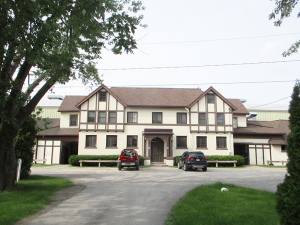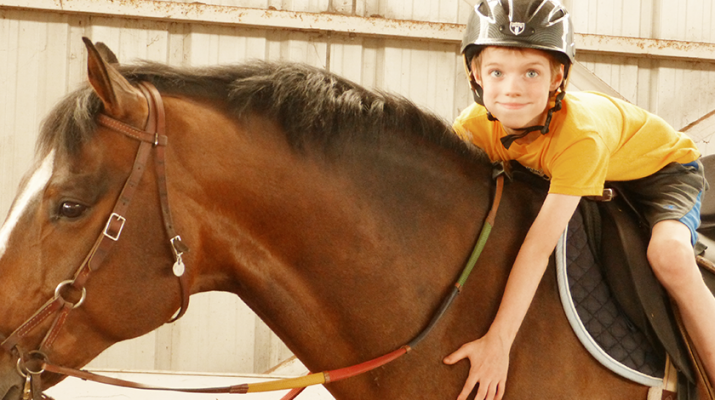A therapeutic riding center making a difference in the lives of kids with special needs — from a horse facility just north of Delaware Park
By Catherine Miller

Tucked just north of Delaware Park is a large property adorned with an English Tudor and gothic style building, whose interior is home to horses.
Yes, horses.
The five-acre facility inside the city houses horses that are teaching young would-be equestrians and special needs children the many benefits of horse riding.
Set on land that was once part of the Pan-American Exhibition, the property at 950 Amherst St. is now home to the Buffalo Therapeutic Riding Center and the Buffalo Equestrian Center.
Horses that previously called this property home once roamed Delaware Park with their riders in the early 1900’s. Now the nonprofit Buffalo Therapeutic Riding Center [BTRC] takes over the facilities on Mondays to provide horse riding experiences to special need students, as young as 6 years old.
“It’s an amazing place,” said Susan Schoellkopf, BRTC’s executive director, who has been affiliated with the riding center for more than 30 years, “We’ve changed a lot of lives here, for both the children and the horses.”
Young people with learning disabilities, mental and emotional impairments, as well as developmentally challenged students join together at the riding center to enjoy an indoor ride on the large mammals. Horses are known to mirror the emotion of their rider, and children seem to pick up on the emotional connection quickly.
Eye contact, physical communication of patting, hugging and riding the horse allow for students with social and communicative challenges to gain a strong sense of understanding with the animal, according to Schoellkopf.
The bond between the student rider and horse grows with each session, allowing for positive psychological and social benefits and increased confidence, Schoellkopf said.
The guided ride on the maned creatures offers physical benefits such as core strengthening, stretching and flexibility improvements, hand-eye coordination and improved movement dexterity and balance, according to Schoellkopf.
The riders, aged 6 to 18, are limited to four students per half-hour session. Each rider has a volunteer and a teacher alongside them for the ride. The session is designed with the intention of aiding the student physically, mentally and emotionally.
Parents say that on days that their children are going to the riding center, they are excited and can’t wait to get there.
Lida Petrella’s son, Sammy has been attending the riding center since May.

“Sammy is more focused, more attentive,” said Petrella, who watches her son ride from the enclosed viewing area. “He definitely looks forward to coming here.”
Many of the young riders have physical disabilities that impair their movement, and are often judged for those disabilities. That changes as they come into the riding facility.
“The students relate easily to the horses,” said Schoellkopf, “The horses don’t judge them. They get up on that horse, and their disabilities disappear.”
All of the instructors are Professional Association of Therapeutic Horsemanship International (PATH)-trained and certified and the BTRC is premiere certified, meaning that the center has gone through a rigorous process to verify that each instructor meets strict criteria for CPR and first aid training as well as how to properly handle the horse and transition and guide the rider for the most beneficially session for each student.
The horses themselves are donated, but they are costly to maintain. They need shelter, grooming and food. That’s why the center is constantly trying to raise money to fund scholarships and maintain the facility.
Horse Shows Scheduled
Adults and teens interested in volunteering are invited to contact the organization to learn about the many volunteer experiences available at the facility.Visit www.thebtrc.org or send an email to becandbtrc@aol.com.
The site also allows for families to file an application for a special needs student who may benefit from the riding sessions

